The government doesn’t dole out hope. Hope is not an entitlement program. Resonating with surprising strength to the nation’s current political predicament, the prescience of despair in Lee Blessing’s Two Rooms is striking despite being penned over a quarter of a century ago for a war-torn time even further behind us. Appearing as the non-musical offering in the Kensington Arts Theatre’s 2016/2017 season, Two Rooms is a battlefield of emotional carnage, derived from a mental terrorism that hijacks the mind and tortures the senses with unanswerable questions. How do you decide whose lives are worth more? Directed by John Nunemaker, this harrowing drama sparks a necessary conversational starter over American foreign policy and politics far more relevant now than could ever be imaginable.
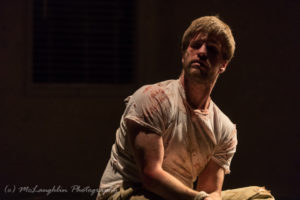
Lee Blessing’s work is intended to take place in the late 1980’s in Beirut but has fuzzy demarcation lines for its exact placement in time. Director John Nunemaker utilizes this vagueness to the production’s advantage, allowing for a universal transcendence some 30 years in the future without having to make any specific markers that indicate a precise time. The character of Michael being held hostage by Arab terrorists in Beirut is just as believable a premise for that time period as it would be in present day, even more so considering the current political upheaval in the United States government.
Though the title of the play is Two Rooms, Set Designer Dan Patrick Leano morphs these dual playing spaces into one barren set. The sandstone wall that encloses both Michael’s office back in America serves as the unseen walls of the room in which he is kept hostage. Leano’s simplistic design allows for the symbolism of the piece to be a prominent focus; this focal point is aided by Lighting and Special Effects Designer Jeff Clausen. Using blue lights when a scene steps away from reality and into a dreaming or wishful state, Clausen enhances the dual nature of the show with subtle grace. But it’s Clausen’s multimedia design that really catches the eye. His use of topically relevant images projected onto the back wall of the room creates an evocative series of moments that stir up a great deal of unsettling emotions and thoughts.
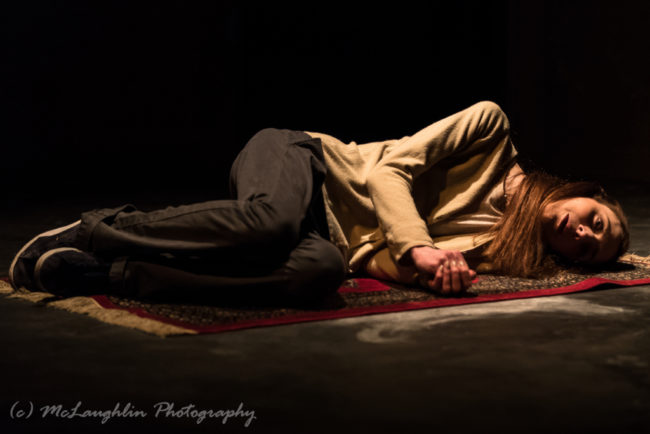
The production’s biggest fault is its missed opportunities when it comes to sound work. While the sound effects that are present, as crafted by Sound Designer Bobby Strickland, are impressive— the muted gunfire and warfare noises outside of the hostage room, the dense clicking of the slide projector with the echo chamber effect underscoring it— it’s the lack of sound that disjoints the production somewhere. Because the scenes slide into one another with only a few blinks of blackout lighting between all the noises in these transitions— mainly actors shuffling on and off (and to their credit some are moving while physically blindfolded)— can be heard and become somewhat distracting. The silences in these blackouts also feels clunky. A hint of underscoring with even just the slightest bit of music, or more of the warzone noises when entering the hostage room or the warbler birds crying in the marsh every time the scene returns to DC would easily fix this awkwardness.
Director John Nunemaker does well enough with the pacing of the show; it moves quickly and smoothly with expedient efficiency. There are moments wherein the dialogue exchanges fall into lulls, though this is more of Blessing’s writing than anything else. Four actors bring their strengths to these rather dimensionless characters, giving them a bit more life and fleshed depth than what Blessing’s brittle framework provides. Despite the cast being of an intimate size, there is an overall lack of an ensemble feel to the production, though this doesn’t detract from the performances as they are as compartmentalized as the play’s narrative.
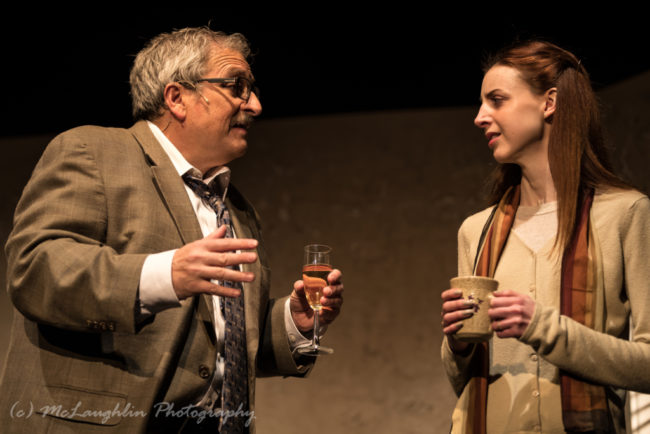
The four characters each live in their own world driven by an emotional agenda. Walker Harris (Dave Gross) is the ruthless reporter, out to snag the superlative story whatever the cost. Ellen Van Oss (Sandra Cox True) is the sterile voice of the state department, unaffected, unfeeling, unmoved by the situation. Lainie Wells (Caity Brown) is the bewildered family of a hostage, ruled solely by her emotional imbalances that would plague any person in such a situation. Michael Wells (Sean Dynan) is the hopeless captive, steered by his own emotional demons though in a far different lane from Lainie. While the primary interactions of the show are experienced between Lainie and Walker or Lainie and Ellen, there are brutally emotional moments that feature Lainie and Michael together, truly haunting and frightfully harrowing to experience.
Nunemaker’s approach to blocking in the space adds a layer of liveliness to the performance, particularly when the Lainie character is watching the Michael character as if she could see his experience as it happens. Fully engaging the characters in spatial awareness, Nunemaker shifts the dynamic between Lainie and her two house visitors every time they come to call, showcasing the perpetual churning waves of their discourse. Again the lighting comes strongly into play when it comes to augmenting Nunemaker’s blocking choices, and these illuminating effects are used to strengthen the production.
The entire cast has moments where their emotional eruptions and expressions could be pushed further. There is a sensation of a glass ceiling capping some of these more riled outbursts, but on the whole the performances are strong and tethered to the floor with heavy leading emotions. For Gross’ character its determination, unwritten by tenacity and Brown’s character inconsolable grief, which absorbs a dozen different flavors of sorrow, frustration, and other negative emotions a bit like a pathos sponge. Dynan’s character is led by a hopelessness that comes and goes in spurts and bursts.
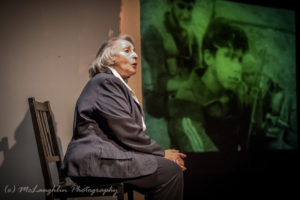
Sandra Cox True’s character is the only one not impacted by this emotional cap. Serving as the untouchable representative of the cold and disengaged state department, True keeps the character aloof and unattached. Completely separated from the notion of emotion, there is a visceral scene that turns the stomach when she addresses the Michael character in a dream. True’s delivery throughout the performance is consistent with this heartless embodying, which makes the moment of raw vulnerability expressed near the play’s end that much more jarring.
Caity Brown puts fast-acting fissures in the emotional ceiling that her character struggles with throughout the production in one epic scene where she spins the hopelessness of the universe into a brutal analogy about Warbler birds and Cuckoo birds. This entire rant wherein she takes her emotional train clear off the rails is one of the most captivating moments in the production. Torn asunder from the pressures of True’s character and Gross’ character, Brown delivers a consistently strong performance throughout the production and keeps the audience engaged with the plight of her pathos.
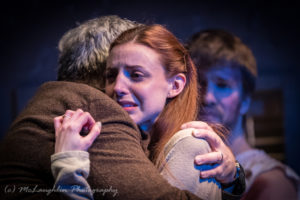
Sean Dynan, who at times is a bit soft-spoken in his line deliver and although the intention of such a choice is clear it makes the language of his text difficult to fully understand, brings an emotionally forward presence to the character of Michael. During one of his more pivotal monologues in the second act there are a great many snaps of fury that burst from him in rapid succession, though each are characterized in a different shade of the feeling. The moments he shares with Brown’s character, either addressing her directly or in his narratively indirect fashion, are among the more heart-wrenching in the play.
Ultimately a play designed to make you question the value of human life, the corruption of our government, the politics of our world, Two Rooms will give you pause and make you think. Highly relevant and topical especially in the current political climate, this drama is well worth considering.
Running Time: Approximately 2 hours and 10 minutes with one intermission
Two Rooms plays through March 4, 2017 at Kensington Arts Theatre located in the Kensington Town Hall— 3710 Mitchell Street in Kensington, MD. For tickets call the box office at (206) 888-6642 or purchase them online.

